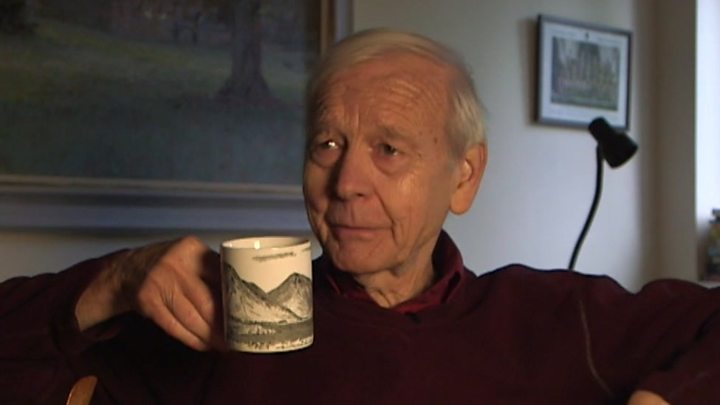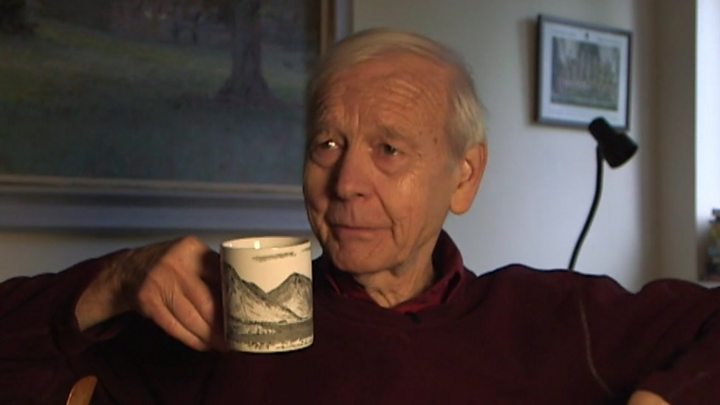John Humphrys: ‘I’m hugely argumentative by instinct’
The veteran presenter reflects on his final Today programme and his career in broadcasting. …


Media playback is unsupported on your device
After 32 years of co-presenting BBC Radio 4’s Today, John Humphrys knew exactly how he wanted his final programme to sound.
“I had told the big boss that I wanted to leave without any fuss at all,” he explains. “At five minutes to nine on the morning of my last programme, I would say, ‘That’s it from us, oh and by the way, this is my last programme. And since I’m leaving, here are a few thoughts.’
“They vetoed that, because it just wouldn’t work. And they persuaded me.”
As a result, his last ever edition of the BBC’s flagship radio news programme ended up being quite an event.
Humphrys spoke to former Prime Minister David Cameron for his final 08:10 interview – the most prestigious slot of the programme. Tony Blair and Dame Edna Everage made appearances too, and for his closing item Humphrys was joined by several former co-hosts, including James Naughtie, Sarah Montague and Sue McGregor.
“I was actually, in spite of my reputation, rather moved by it,” he says (despite thinking it was “slightly over-the-top”).
The timing of Humphrys’ departure is somewhat surprising, considering it came six weeks before the Brexit deadline. But he says he was “absolutely not in the slightest” bit tempted to hang on, adding that “there would always be another reason for staying a little bit longer”.
There’s a recurring theme in the articles that were written about Humphrys around the time of his exit. Words like “Rottweiler” and “grumpy” crop up a lot.
“With all the boss class he was irascible, impatient and magnificently argumentative,” wrote former editor Rod Liddle in The Sunday Times. “For the past 20 years or more, senior figures wanted him out. They considered his approach too macho.”
In The New Statesman, another former editor, Roger Mosey, said Humphrys “excelled at the big gladiatorial combats; in his prime, there was nobody better at asking the questions listeners wanted to hear”.
Now that both Humphrys and Jeremy Paxman have left the BBC, there’s a suggestion that their combative style of interviewing may have had its day. Indeed, Radio 4 PM presenter Evan Davis has criticised those types of interviews as “worn out” and “not a particular public service”.
Humphrys discusses this at length in his memoirs, which are published this week. “I don’t want the audience to think we presenters and the politicians we interview are best mates, or even friends,” he writes in A Day Like Today. “Evan often uses their first names on air. I have always refused to do that and I wish they did not use ours.”
His own impatience during interviews, he now explains to BBC News, is largely down to the politicians who he says “refuse to engage on any level at all” – exchanges he finds “unrewarding and rather pointless”.
“It’s when you ask them a perfectly reasonable question, and they employ one of these gambits to avoid answering it, and you can see they’ve had media training or they’ve been told by their spin doctor not to answer it. The audience sees through it. I got more complaints about politicians who simply refused to answer the question than anything else.”
But he also points out that changes in interviewing styles over the years do not necessarily mean presenters nowadays are any less effective than they used to be.
“Justin [Webb] is every bit as tough as I was,” Humphrys says of one of Today’s remaining hosts. “He may have a slightly more emollient approach and he might get into an interview rather more gently than I did, but you realise if you’re listening that he knows what’s going on, he does his homework, and you wait for the killer question, and it will come.”
Humphrys and Webb’s warm relationship was evidenced by the fact that Webb was chosen to co-host the 76-year-old’s final programme. But he also acknowledged Humphrys’ occasional bad temper, writing in the Radio Times that Humphrys wouldn’t hesitate to “shout” and “throw things” if he was unhappy.
“Untrue. Justin will hear from my lawyer,” Humphrys replies jokingly (we think) when this is put to him. “Look,” he continues, “I get worked up before and sometimes even during the programme – I was wholly engaged and I couldn’t do it by half.
“I am hugely argumentative by instinct, I’m fairly combative – not physically – and if I see something of which I disapprove, if I don’t like the running order or brief, I will say so. And with some people, I’m able to have perfectly rational and sensible conversations. With other people, for whatever reason, personality clashes or whatever, I will occasionally lose my temper. I’m always sorry when I do.”
How many times has he threatened to resign?
“Hang on a minute, how long have we got?” He jokingly pretends to count on both hands. “I’m afraid, rather childishly, I have threatened to resign once or twice – quite a few times probably.”
He does not recall many specific examples, but Charlotte Edwardes of The Times reported in 2016 that one such occasion was when Humphrys found out he wouldn’t be presenting on the morning of the EU referendum result. (In the end, he did present that programme, with Montague.)
Humphrys’ memoirs include his reflections on how journalism, and the BBC, have changed since he began presenting Today in 1987.
One of the most significant developments of recent years has been the annual publication of BBC stars’ salaries after pressure from the government. That has led to all kinds of issues for the corporation, not least the gender pay discrepancies which emerged.
Some presenters, such as Graham Norton, took issue with the list’s publication, but Humphrys says he’s “always been happy with it”.
“And I’ve always been puzzled by the BBC’s hitherto refusal to do so. I’ve never been ashamed of how much I earned. There was a time when I was earning a very large amount indeed.” In 2016/17, Humphrys earned between £600,000-£650,000 before he took a pay cut to around £290,000. “But the licence payer has a right to know.”
However, since the BBC began revealing salaries, it has lost some of its biggest names to the commercial sector, including Chris Evans, Simon Mayo and Eddie Mair. Although not the only factor in their exits, director general Tony Hall referred to the lists as a “poacher’s charter”.
“Well, let it [be one],” Humphrys replies. “Look, if someone wants to employ Eddie Mair, what’s to stop them ringing him up and saying, ‘How much you earning Eddie? Oh, well we can double that’. It’s a market, and if they want to take him from the BBC, fine.”
His relationship with Mair, incidentally, is shown in the book to have been strained.
Humphrys recalls an occasion when the former PM presenter fronted an item about the leaking of an off-air conversation between Humphrys and BBC North America editor Jon Sopel, in which they appeared to make light of the gender gap revealed by the star salaries list. Humphrys admits he “went ballistic” about how Mair tackled the events on air, without allowing him a right of reply.
He does, however, express regret and “takes full responsibility” for his conversation with Sopel itself. “I naively believed that the people you work with are not sitting there listening furtively to your conversations that you think are little private chats at four o’clock in the morning, when you’re both taking the mickey out of each other. But I do find the reaction to be preposterous.”
Humphrys adds that he “has a vague suspicion” of who leaked the recording, but declines to name names.
‘Absolute tosh’
Notably, Humphrys is not on Twitter, something practically unthinkable for a journalist in 2019. The social media platform is a crucial tool for reporters.
Considering the pasting Humphrys gave George Entwistle in 2012 over the former director general’s failure to stay across news headlines and spot the Newsnight scandal sooner, is it not hypocritical for Humphrys himself to have refused to join such a platform?
“It’s a very good question, but let me throw it back to you,” he says. “If Donald Trump tweets something important, is it going to be in the newspapers and on every single outlet immediately? Yes. Do I read all of those newspapers? Yes. So the idea that by not spending eight hours of my day reading every idiotic and sometimes bizarre or offensive tweet I am somehow missing something is absolute tosh.”
Safe to say, he will not be spending his radio retirement learning how to use social media. Instead, Humphrys is keen to have a few months off, although he will continue to present Mastermind on BBC Two.
The most important question, of course, is whether he’d consider doing Strictly Come Dancing now he’s free from the constraints of being a serious news presenter.
“I have been asked twice over the years, and the answer each time was no. The answer remains no,” he says. “Look, poor old John Sergeant made a fool of himself. He’s a great mate of mine and, moreover, he turned making a fool of himself into a very successful career. So good on him, but not for me.
“And anyway, I’ve got two left feet.”
John Humphrys: A life in journalism
- Humphrys’ career began in newspapers in Wales. After leaving school, he spent two years working on the Penarth Times, then worked for the Merthyr Express and the Western Mail.
- He moved into broadcasting in his 20s, and while working for the Welsh commercial TV channel TWW he was the first reporter on site of the Aberfan disaster in October 1966.
- He joined the BBC later that year, first as a regional reporter, during which time he covered the Liverpool dock strikes, and then as a foreign correspondent, which saw him cover the resignation of Richard Nixon in 1974.
- Since 1981, he has largely remained in the studio. He presented the BBC’s Nine O’Clock News before joining Today in 1987. It was there that he developed his reputation as one of the corporation’s most ferocious interviewers and he became the presenter most feared by politicians.




